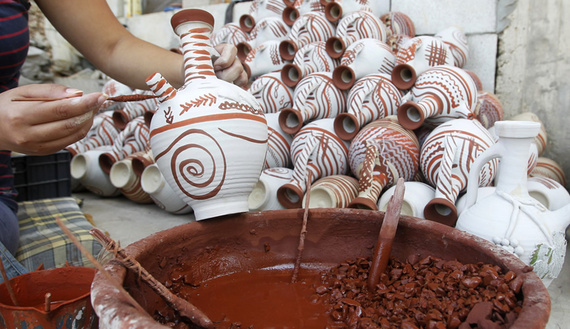Melissa Tabeek writes: In the workshop of the Barchini family, science and art collide. Dana Barchini, 26, and her father Joseph Barchini, 80, both potters and sculptors, work alongside each other, whether it be in the family workspace or testing clay in the Bekaa Valley to be used for their pieces. Joseph, educated in France at the Ecole des Metiers d’art, returned to Lebanon after also receiving his doctorate at the Sorbonne, where he studied the technical aspects of the ceramics the potters created in his native country, as well as their socio-economic situation. He returned to Lebanon to use his knowledge to improve the potters’ situation and to help modernize their work process. Joseph opened his first workshop in 1965 in his parents’ home in Beirut, but when the civil war began, he had to move north. Now he spends nearly every day in his second workshop he built in Ain Saade in 1980, a village eight miles north of Beirut, testing different aspects of the pottery craft and creating new glazes through chemical reactions.
Dana is one of the many female artisans in Lebanon who are continuing a patriarchal family tradition from their fathers or grandfathers as their full-time job, despite the growing difficulties of maintaining craftsmanship traditions. The number of potters in the mountains that Joseph works with, for one, has greatly declined since he began when he was 25. He talks about a time when there were more than 100 — a number that has dwindled to fewer than 30 in the past few years.
Fatima Tartoussi, 37, is a woman working in a man’s world of metal in Lebanon’s northern city of Tripoli. From stalls in Tripoli’s market to a multiple-room workshop in Bab al-Rmeil, Tartoussi works with metal as well as manages the family business. She learned this craft from her father, who despite not having sons to pass the business onto did not initially want her going into this type of work because of the physical demands of the job.
“I was 7 years old when after going to school I would see my father and his workers doing this. I wanted to do the same, but my father would not allow it. So after school, I would steal wood, copper and iron, anything I could find,” Tartoussi told Al-Monitor, as she skillfully makes a stainless steel nameplate, the smell of iron hanging heavy in the air in her workshop. When her father saw her talent, he eventually relented.
Maya Hassun shares this concern in passing the soap-making tradition in her family to her two children. Hassun, 34, has a bachelor’s and master’s degree in law, but the pull of soap proved too strong. Her grandfather used to cook olive oil and bay leaf soap in Kfarhata, a village north of the southern city of Sidon. Before he died, he left his notebook of recipes and instructions from his lifetime of work with soap to Hassun, who had spent much time in his atelier as a child. Since then, she has come far from experimenting in her kitchen 18 years ago, now operating a thriving business, Sabbouna, with her husband, which includes a showroom in Sidon and a large workshop in the Chouf region.
There are many obstacles to overcome, Dana conceded, including a lack of government support, technical schools, an easy market and an availability of cheaper goods. But she is still hopeful for the future.
“It is good that I was persistent and that I didn’t give up because look what I’m trying to continue. Imagine I did not do this and those were left behind,” Dana said, pointing to her father’s ceramic pieces on a shelf behind her, “I am carrying on something very beautiful to show people something extraordinary.”

